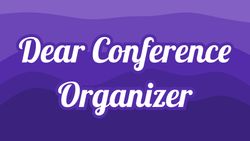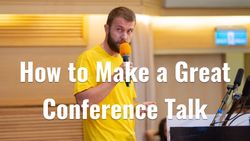How to Enjoy Your Next Conference Better
Sometimes, when I go to a conference and mingle with people during lunch or a social event, I see someone sitting alone, looking at their phone, and not talking to anyone. At one social dinner, I saw a guy who spent one hour drinking two beers (everyone got them for free), ate some food, browsed probably half of the internet on his phone, and then just left home. And that makes me sad because it reminds me of myself at my early Python conferences.
My first ever Python conference was EuroPython 2015 in Bilbao. I was lucky that my employer had the budget to send a bunch of people from my team to the conference. We had a great time! We attended some talks together, went for dinners together, and generally had a blast. The same happened in 2016 and 2017. I always went with some friends from work. We always stuck together and had a great time.
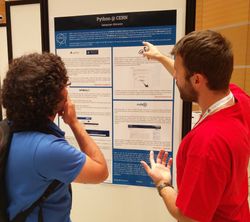
The year 2018 was different. Budgets were cut, some of my colleagues switched jobs, and the new ones were more interested in JavaScript than Python. So, no one from my work was going to EuroPython, but I decided to go anyway. Why wouldn't I? All the previous editions were so much fun!
The conference in 2018 was a strange experience. I wasn't used to talking to strangers, so I told myself that it was OK and I didn't need to meet new people. I could just focus on watching talks. Luckily, I finally forced myself to go to the pub where the Python crowd was gathering in the evenings for drinking and chatting. I sat at a table with some other conference folks and tried to join their conversation. But it was quite technical, and I wasn't really interested in talking about Kubernetes in a pub after a whole day of listening to technical stuff. I mostly listened to the conversation, sometimes engaging in some small talk with my nearest neighbors as new people were coming and going. It was starting to get boring. Then, someone took out a card game, and the conversation switched to a completely casual one when a bunch of us started playing. That was a lot of fun and probably the main thing that convinced me to come back the next day.
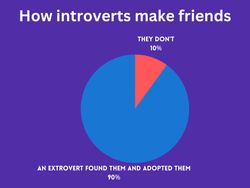
I continued going to the pub in the evenings and eventually met more like-minded people. I'm still friends with some folks I've met that year in Edinburgh (even though some of them moved away from Python, and I like them a bit less 😉). The more people I already knew, the easier it was to meet new ones. When I saw someone I knew talking with someone else, it was easy to approach them and join the conversation.
The next year's EuroPython didn't feel like I was going to a conference to hear technical talks. Rather - I was going to meet some old friends I hadn't seen in a while. And each year, it's easier for me to meet new people. I guess the fact that I got more comfortable talking with strangers plays an important role, but talking to strangers is a skill that can be trained like any other.
Why am I telling you all this? Because if I stuck with only going to see the talks and staying in my hotel at the end of the day, I would probably stop going to conferences after 1-2 years (especially now that, as a freelancer, I have to pay for them myself). If you skip networking [1] meeting new people, you miss the most important part of each conference. You can watch videos of all the talks later, but conferences should be for you to make new friends, exchange ideas, or just have fun playing Exploding Kittens in a pub at 1 AM with folks you met two hours ago.
What else can you do to make the most of your next conference?
During the day
Research what talks you want to attend the most. Being spontaneous and joining a random talk because a friend is going there is fine. But you don't want to miss talks you really wanted to see only because you forget when they take place. Sure, you can watch the recording later, but what if you want to talk with the speaker? Good luck finding them later among 800 other people in the venue. Note that some conferences have applications or an easy way to add talks to your calendar, but unfortunately, not all of them (and I much more prefer a dedicated app than cluttering my calendar). So make sure you keep track of the most interesting talks in advance.
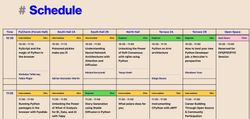
Try something new. Attend talks that are completely out of your area of expertise. They might be boring or hard to understand. But you might learn something totally new or discover ideas that can translate to your work. Try to broaden your horizons as much as possible (even if only superficially). It will pay off in the future, especially in our line of work.
Have some simple conversation starters ready in your head. This is especially useful during lunch or coffee breaks when you join someone at a table and want to break the awkward silence. General questions like "What do you do?" or "What do you use Python for?" work, but personally, I prefer to ask some conference-specific ones:
- Did you watch any great talks today that you would recommend?
- Is it your first time at this conference?
- No? How do you like it compared to previous years?
- Yes? How do you like it so far?
- What talks are you really looking forward to seeing today?
- Do you often go to other Python conferences?
I like those questions because I'm genuinely curious about the answer to each single one of them. I want to find recommendations of interesting talks I should watch and other cool conferences I should visit one day.
If you're a speaker, have an "elevator pitch" ready. When they see "speaker" on your badge, most people will ask you about your talk. And I'm never prepared to answer this question on the first day! So my first answers are needlessly long and detailed instead of giving people a 2-3 sentence pitch and only going into the details if they keep asking more questions. This suggestion also applies when people ask you where you work and what you do. I don't know if it's just me, but I tend to give long and boring answers if I'm unprepared for such questions. So, at some point, I decided to think about my answers more carefully and came up with a summary highlighting the most interesting parts of my job.
Put a catchy tagline on your badge. Some conferences let you customize a badge and put some text on it. And most people use that space to say they are a "Software developer at XYZ". Great, you're a software developer. Just like 90% of the people at this conference! How about you put a conversation starter there? What's your hobby? What are you most proud of? What's a non-technical topic that you can talk about for hours? Write a silly joke and make someone laugh. Or even better, put the first half of a joke (Why do Java programmers wear glasses?) so people will start a conversation by asking you for the punchline.
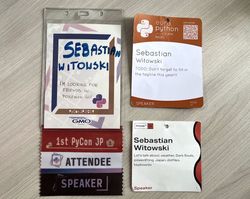
Meet new people. It's easy to stick with your work buddies. I'm sure you're going to have a great time. But you're going to have an even better time if you also meet new people who do Python programming in a different industry, in a different country, or do something completely different from what you do.
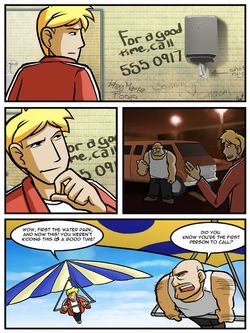
Talk with people at the booths. Especially if their company makes software you like using. Speaking with people at the booths is the easiest way to talk with someone because it's often their job to talk with whoever wants to listen. And they are at the conference not only to sell you something or recruit you. Well, some of them are, and some of those conversations will be boring. But many recruiters bring their engineering friends. And those engineers can be very knowledgeable and passionate about their products or programming in general. I remember spending hours talking with folks from one booth over the course of a few days only because, as we spoke, I discovered that we all share a common love for various productivity tools. I missed a lot of talks, but in exchange, we discussed countless ideas and shared our development setups, so it was totally worth it.
Prepare and recharge
Meeting new people, talking, and listening to talks can be exhausting. Don't forget to bring a couple of things that will make your day much more comfortable:
- Water. Ideally, take a bottle that you can refill at water fountains.
- Chewing gum. You will need it if you want to talk to someone after drinking coffee the whole day.
- Layers of clothes. Some rooms have AC, some don't.
Also, remember your glasses if you're shortsighted like I am. I don't wear glasses on a daily basis, so sometimes I forget to bring them with me. Then, I have to sit in the front rows to be able to read anything on the screen. And even if you do remember to have your glasses with you, try to sit in the front rows (unless you need to work on your computer in the meantime - then please don't sit in the front rows). This is a great encouragement for the speaker because no one likes to talk to an empty room. And it will also help you focus better on the talk.
Now for the most important advice that I learned to appreciate more and more as I grew older - find time to recharge. Or rather, make time to recharge. After a week-long conference, I'm mentally and physically drained (and often end up getting sick immediately after coming back home). Attending talks and staying focused for many hours every day is tough. And most of the time, right after the last talk finishes, you go out for dinner and drinks with some fellow conference-goers. You sleep a little, and the next day, this process repeats. If you enjoy it, that's great. But since last year, I've started taking breaks during the day to go to my room, take a shower, and either have a quick nap or just lie down in a quiet room for some time. That helps me tremendously in maintaining a high energy level until the end of the day. If I don't do it, at around 10 PM, I no longer have any energy left to talk with people. It's better to skip a talk or two than skip the social part. You can watch the talks later.
Evenings
In the evening, just go to where other conference attendees gather. And just like during the day, have some conversation starters ready. A conversation starter can be a card game that you can use to join a table with other people. It can be a geeky t-shirt that someone else can comment on while you both wait at the bar. If you like to talk with people but you're not good at being the first to speak, try to come up with ideas to make it easier for others to speak to you first.
Not every interaction you have will be a pleasant one. People are different. Some will have completely different interests than you, and you will struggle to get the conversation flowing. Some love to argue about technical details for hours (which is the last thing I want to do when I go for a pint). Some are socially awkward. But most of the conference-goers are great! Don't think that if you don't hit it off with the first person you talk to, then all future conversations will be the same. Just excuse yourself and talk with someone else. Join a table with more people and see if the conversation interests you. If not, move along. I guarantee you will eventually find like-minded people you will enjoy talking with.
Oh, and come back next year!
Boy, I hate that word. Business people gave it such a negative meaning. ↩︎
